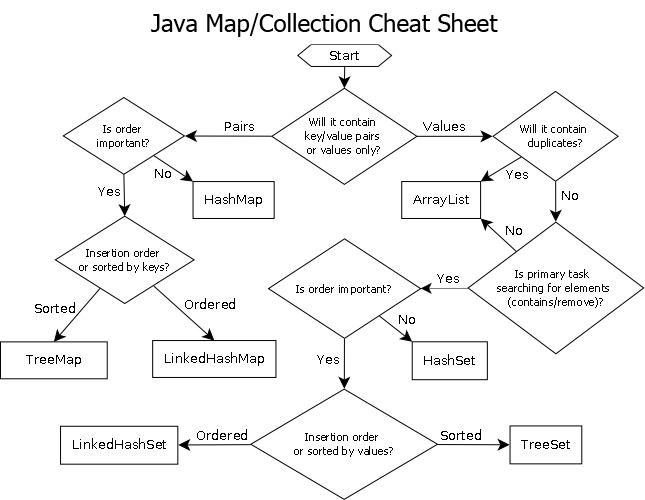Last active
October 18, 2019 16:07
-
-
Save milingo/9061630 to your computer and use it in GitHub Desktop.
Java
This file contains bidirectional Unicode text that may be interpreted or compiled differently than what appears below. To review, open the file in an editor that reveals hidden Unicode characters.
Learn more about bidirectional Unicode characters
| // Init | |
| new String[]{"a", "b"} | |
| List<String> list = new ArrayList<String>( | |
| Arrays.asList("String A", "String B", "String C") | |
| ); | |
| Map<String, Owner> owners = new HashMap<String, Owner>() {{ | |
| put("no-money", createOwnerWithoutMoney()); | |
| }}; | |
| // convert | |
| new HashSet<>(Arrays.asList(new String[]{"a", "b"})); | |
| // utils | |
| public static <T> boolean any(Collection<T> collection, ConditionalFunction<T> f) { | |
| if (collection != null) { | |
| for (T e : collection) { | |
| if (f.fulfills(e)) { | |
| return true; | |
| } | |
| } | |
| } | |
| return false; | |
| } | |
| public static <T> boolean isEmpty(Collection<T> list) { | |
| return list == null || list.isEmpty(); | |
| } | |
| // utils tests | |
| public void testAny(List<Integer> numbers, boolean expected) throws Exception { | |
| ConditionalFunction<Integer> isEven = new ConditionalFunction<Integer>() { | |
| public boolean fulfills(Integer number) { | |
| return number % 2 == 0; | |
| } | |
| }; | |
| assertTrue(CollectionUtils.any(numbers, isEven) == expected); | |
| } |
This file contains bidirectional Unicode text that may be interpreted or compiled differently than what appears below. To review, open the file in an editor that reveals hidden Unicode characters.
Learn more about bidirectional Unicode characters
| public class CollectionUtils { | |
| /** | |
| * Check the intersection between list1 and list2 is not empty. | |
| * | |
| * @param list1 | |
| * @param list2 | |
| * @param f the function to | |
| * @return whether the intersection is empty. | |
| */ | |
| public static Boolean emptyIntersection(Collection<? extends Object> list1, Collection<? extends Object> list2, Predicate<? super Object> f) { | |
| return !list1.parallelStream().anyMatch(f); | |
| } | |
| /** | |
| * Check the intersection between list1 and list2 is not empty. | |
| * | |
| * @param list1 | |
| * @param list2 | |
| * @return whether the intersection is empty. | |
| */ | |
| public static Boolean emptyIntersection(Collection<? extends Object> list1, Collection<? extends Object> list2) { | |
| return emptyIntersection(list1, list2, list2::contains); | |
| } | |
| /** | |
| * Check if the first collection contains at least one element which is not in the second collection. | |
| * | |
| * @param list1 | |
| * @param list2 | |
| * @return | |
| */ | |
| public static Boolean hasDifferentElements(Collection<? extends Object> list1, Collection<? extends Object> list2, Predicate<? super Object> f) { | |
| return list1.parallelStream().anyMatch(f); | |
| } | |
| /** | |
| * Check if the first collection contains at least one element which is not in the second collection. | |
| * | |
| * @param list1 | |
| * @param list2 | |
| * @return | |
| */ | |
| public static Boolean hasDifferentElements(Collection<? extends Object> list1, Collection<? extends Object> list2) { | |
| return hasDifferentElements(list1, list2, item -> !list2.contains(item)); | |
| } | |
| public static <T> boolean isEmpty(Collection<T> list) { | |
| return list == null || list.isEmpty(); | |
| } | |
| public static void addIfNotNull(List list, Object item) { | |
| if (item != null) { | |
| list.add(item); | |
| } | |
| } | |
| public static <T> Optional<T> findFirstNotNull(List<T> list) { | |
| return list.stream().filter(x -> x != null).findFirst(); | |
| } | |
| public static Optional<String> findFirstNotNullOrEmpty(List<String> list) { | |
| return list.stream().filter(x -> !StringUtils.isNullOrEmpty(x)).findFirst(); | |
| } | |
| } |
This file contains bidirectional Unicode text that may be interpreted or compiled differently than what appears below. To review, open the file in an editor that reveals hidden Unicode characters.
Learn more about bidirectional Unicode characters
| public <T extends Shape> void addIfPretty(List<T> shapes, T shape) { | |
| if (shape.isPretty()) { | |
| shapes.add(shape); | |
| } | |
| } |
This file contains bidirectional Unicode text that may be interpreted or compiled differently than what appears below. To review, open the file in an editor that reveals hidden Unicode characters.
Learn more about bidirectional Unicode characters
| import java.text.MessageFormat; | |
| String pattern = "I have {0} apples"; | |
| String message = MessageFormat.format(pattern, 3); |
Sign up for free
to join this conversation on GitHub.
Already have an account?
Sign in to comment
